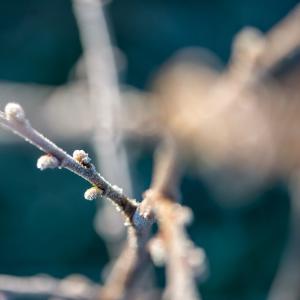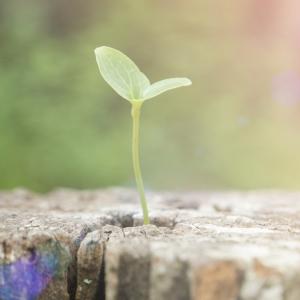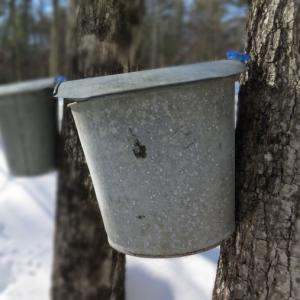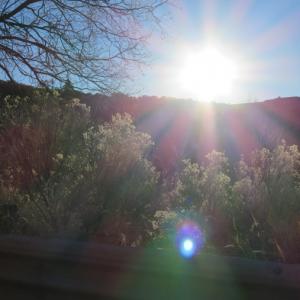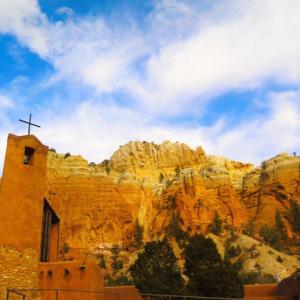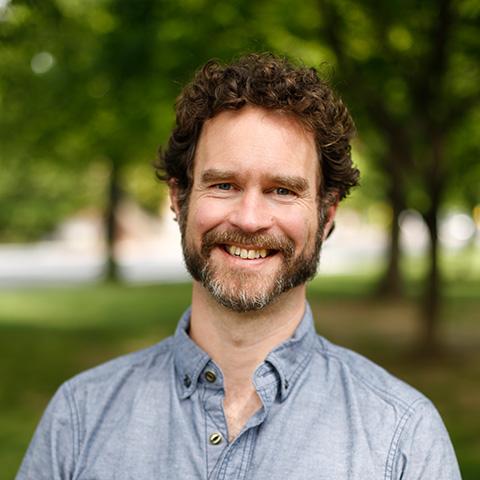
Timothy McMahan Kingis a writer, senior fellow for clergy for a New Drug Policy, and the owner of Vagabond Strategies. He is the former chief strategy officer for Sojourners and has served as a consultant for national nonprofits, advocacy campaigns, and political candidates. The author of Addiction Nation: What the Opioid Crisis Reveals About Us (Herald Press, 2019), he is an active advocate for those in recovery and to reform United States drug policy. His second book, What Are Drugs For? is forthcoming with Fortress Press. He has written widely for national publications, including The Wall Street Journal and CNN.
He's spoken and lectured across the country from Georgetown University to the Chautauqua Institution. His writing is required reading in classrooms and graduate programs across the country for his unique perspective at the intersection of faith, science, drugs, and addiction while calling for an end to a culture of punishment.
A graduate of North Park University with degrees in theology and philosophy, McMahan King has a deep interest in what healing looks like for the individual and our culture. Growing up on a farm in New Hampshire, he has a keen awareness of the ways in which our communities and the natural environment can call us into greater wholeness.
McMahan King lives with his wife, Hannah; their daughter, Ruth; and their dog, Hank, in North Carolina.
Posts By This Author
What Christians Get Wrong About Drug Use
Supervised consumption sites are controversial in the United States. Why? I believe opposition to them is rooted in mistaken Christian moral assumptions in regard to drugs — and the people who use them.
The Fatal Fanaticism of Drug Prohibition
My doctor's reaction to my disorder was rare. When he noticed that my prescriptions were running out faster than they should, he did not shame, blame, or accuse me of any grave moral failing. With kindness and compassion, he noted that I had developed an addiction and immediately assured me that I had done nothing wrong.
Why Do Christians Deny William Wilberforce's Drug Addiction?
The acknowledgment of Wilberforce’s addiction does not tarnish his story — it completes it. His life can teach us that while addictions are harmful in and of themselves, many of the other negative consequences we often associate with addiction are created or exacerbated by how we treat those with addictions.
The U.S. Drug Problem Isn't Tied to Immigration
The United States has a long history of blaming immigrants for our problems. This misplaced blame fuels the fears of “invasion” and creates a false image of a deadly war between innocent native-born populations and corrupting foreigners. Instead of “welcoming the stranger,” we project our problems on those who are vulnerable. We perpetuate scapegoating instead of investing in the transformation needed to save lives.
Grace is the Most Powerful Antidote for Addiction
In the United States, we count drug overdoses per 100,000, not per million. The comparable numbers are 6 per million in Portugal, 21.3 per million for the European Union, and 217 per million in the United States.
Death and Resurrection. Addiction and Recovery
Good Friday and Easter Sunday are not just moments of remembering events of 2,000 years ago but a celebration of an ongoing reality. Examples of resurrection come in unlikely places. Recently, I found one in a 2013 study of brain scans or people recovering from severe addictions.
Saving Seeds, Soil, and Souls
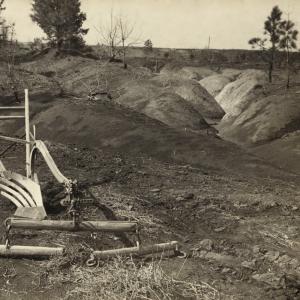
Everett Historical / Shutterstock
THE PLOW. Today it is a nostalgic symbol of a nearly forgotten agrarian past. This farm tool evokes scenes of wholesome farmers who, by the sweat of their brow, churn under dark, rich soil with help from a friendly beast of burden. After scattering seeds of wheat and the blessing of good rain, those fields will become amber waves of grain. The family will celebrate another good harvest. The bread will sustain them through another winter until fields can be planted again.
Scraaatch. Wait a minute! Wes Jackson, geneticist, farmer, and author, wants to interrupt this pastoral vision. In fact, he would interpret it quite differently. He might describe a scene of environmental carnage in which an unwitting population slowly sows the seeds of our own destruction by slipping the plow blade under the living skin of a quickly failing planet. “The plow has destroyed more options for future generations than the sword,” Jackson states bluntly.
Nearly half of the world’s soil suitable for growing crops has disappeared since humans started tilling and planting. Today, up to 70 percent of our caloric intake comes from staple cereal crops planted in large-scale annual monocultures. A study by the National Academy of Sciences estimates that we are losing soil 10 times faster than we can replace it. While Jackson acknowledges that over-reliance on fossil fuels is a crucial issue, he argues that “soil is more important than oil and just as nonrenewable.”
In addition to the danger of soil loss, agricultural production “provides the lion’s share of greenhouse-gas emissions from the food system, releasing up to 86 percent of all food-related anthropogenic greenhouse-gas emissions.” The global food production system—from planting to packaging—contributes about one-third of all greenhouse-gas emissions, though this topic was not part of the recent climate negotiations in Paris.
While practices of low-till and no-till annual crops help reduce erosion and increase the availability of arable land as a carbon sink, these half-measures aren’t effective enough, according to Jackson. What he proposes is nothing less than a wholescale rethinking of the fundamental tenets of agriculture.
Every Temple Falls
The fate of the Temple of Artemis, the fate of any temple, is one that need not be feared. Death, and collapse, have lost their sting. This process of decay is not an inherently ugly one. There was beauty in those remaining stones and still value in the ones that had already returned to the ground from whence they had been pulled.
Whether human or stone, from dust we have come and to dust we shall return.
4 Ways to Help Your Community Talk About Environmental Ethics
In a world of highly charged political rhetoric, the essay provides language and a framework for a community discussion on environmental ethics that takes a step back from immediate policy debate. This work doesn’t diminish the importance of these other discussions; rather it provides a context in which that work might be more readily possible.
Our ability to make meaningful collective moral decision requires us to be able to first have enough common moral language to have a conversation. This might be a good place to start.
'Cheap Grace' and Climate Change
Novelist Jonathan Franzen was getting hammered earlier this month. He recently wrote a piece delving into his ornithological passion in The New Yorker entitled “Carbon Capture: Has climate change made it harder for people to care about conservation?”
The Audubon Society has accused him of “extreme intellectual dishonesty,”Grist has labeled him “confused,” and Think Progress held nothing back and called his recent article “bird brained.” (My favorite so far might be the Washington Post saying that the Audubon has “flipped Franzen the bird.”)
Some of this criticism, in my opinion, is justified. Franzen set up an option between treating the planet with “disfiguring aggression” to try and mitigate climate change related emissions or “with palliation and sympathy” since the battle has already been lost. This choice, as the pieces above point out, is a false one.
Unfortunately, those controversial statements have covered over what I found to be the core argument of the article, and his most compelling case.
The Wisdom of Those Who Plant Seeds
The day after Easter, it snowed. I was carrying in my last buckets of sap before leaving for Portland and was not surprised by the flurries, but they still stymied my expectations of warmer weather. The equinox had passed several weeks before, and while the start of spring had been marked on the calendar, it was (is) dragging its feet in coming.
Who has known the mind of God or even a good 7-day weather forecast?
We see and know in part. Certainty has never been the steady state of the human condition. Our lives are stretched with the awareness that clarity, at its best, comes with a smudge.
The experience of knowing we do not know can be felt in different ways. One is confusion, another, mystery. Both are confrontations of the hidden or unknown, but one brings us to awe and the other despair. One can leave us feeling isolated and the other in wonder at our relationship to that which is so much greater than ourselves.
The space between the two is not in the level of knowledge but rather our relationship to the knowing and unknowing itself. In the midst of our unknowing, we are faced with a choice: passive uncertainty or the stumbling action of faith. The beginning of wisdom is not the expectation of certainty with knowledge but the understanding that the kind of life most worth living is always an act of faith.
The Mundane Resurrection
It was five years ago now. I had recently finished a few week stay in the ICU, more than two months in the hospital, and more than one conversation between my parents and doctors about whether I would pull through. Still, I had made it, and after several months of regular home nurse visits, fentanyl patches, dilaudid pills, and 12 hours a day on an IV for liquid and nutrition, I was stable but still far from recovered.
The Saturday before Easter was sunny and unseasonably but appropriately warm. My mother and I took a walk outside, over a mile, the furthest I had gone in nearly five months.
“Wouldn’t it be poetic,” I asked, “If suddenly this whole illness, everything that went wrong in the hospital, all made sense tomorrow on Easter?”
“Hunny,” my mom responded kindly, “I think that’s a lot of pressure to put on the pastor. Don’t you?”
The next day was seasonably and appropriately repetitious. I heard nothing new. The same Easter story that had been read for centuries on centuries was read again. I received no specialized message from the divine about my own pain and struggle. That morning, I realized that might be the point.
Jesus came to make resurrection mundane.
'I Was an Idiot' as a Sign of Grace
Few people in my life would likely make the mistake of characterizing me as a naturally disciplined or pious person. Zealous, maybe. Pious, no. I’ve tended to live life in a passionate pursuit of a particular direction only to stumble, fall, get back up, and run a different way (not necessarily opposite, just different).
Thus, it has been an interesting experience for me this Lent to spend time reading, writing, and reflecting on discipline and ascetic practices. This stumbling and turning has often felt like an aimless back and forth, but in these weeks of reflection, it has been encouraging to look back and see growth. While the back and forth has been real, what has seemed like “just meanderings” have turned out to have some forward direction.
Father Richard Rohr gives this encouragement, “The steps to maturity are, by their very nature, immature.”
As we look back, each step behind us is going to seem immature, maybe even like a mistake. Hitting our head and saying “God, I was such an idiot back then,” is evidence of grace at work in our lives. The ability to see the ways we failed that were invisible to us at the time, is a sign of our growth in wisdom and discernment. This is often hard for me to accept.
The Beginners' Guide to the Sound of Sap
If you listen, each bucket has its own special sound. First are the empty buckets and their muted ting of dripping sap falling straight to the galvanized steel bottom. Next is the dop that reverberates from the slightly sweet drop running off the spile to a thin layer of liquid below. But it is the soft, and all too rare and timeless plop that I wait for. That quiet plop (or sometimes plip) signals that over half of that the three-gallon bucket is full and the tap is giving in abundance.
There is a slight quickening of the heart when the bucket is heavy enough to need two hands to pull off the hook. Then an involuntary smile to hear the pitch of the shwoosh ascend as the smaller bucket presents it’s offering to the larger. But sometimes, before I touch the bucket at all, I stop and wait to hear what it has to say. Ting? Dop? Plip? Plop?
I look at the tree and then its neighbors. I strain to hear the rhythm of the buckets around me and wonder, what makes one tap run so well when others are nearly dry?
When the World Looks Back
Lent is a season of preparation. But the process of preparing for Easter does not need to be all negative commitments and focused on the things we don’t do.
One opportunity for developing new positive practices during Lent involves learning to see. The Gospels recount at least three different instances after the resurrection in which followers of Jesus were not able to recognize or “see” him: Mary at the tomb mistaking Jesus for the gardener, the road to Emmaus, and the delayed reaction when Jesus gave great fishing advice.
The truth of Easter is not always readily apparent. It requires the ability to see clearly. This means rubbing our eyes, clearing them of gunk, and focusing our vision.
Having recently shifted from spending most of my day in an office to spending almost all of it outside, I’ve been ruminating on what it might mean to practice seeing the non-human or natural world more clearly. Here are my initial reflections:
Have you ever been moved by a sunset? A star-filled canopy of the night sky? A canyon-filled horizon? A towering wooded cathedral?
What was the feeling? Gratitude for the beauty? Humility in the midst of grandeur? Inspired to greatness while experiencing greatness? Joy in celebration of it all?
How a Week With Monks Changed My Views on Lent
At the heart of the Lenten season is an interesting paradox.
Lent is not observed in the making of Lenten commitments, but you can’t actually observe Lent without making a commitment.
Elsewhere at Sojourners, Jarrod McKenna reminds us that Lent is not ultimately about “giving up stuff” but about “the preparation of our hearts for what God has done in Christ.” Adam Ericksen encourages us that, “The worst thing we can do during Lent is to be tempted to earn God’s favor through self-denial.”
To both these points and posts I say, amen.
But as a lifelong Protestant who recently returned from spending time with Benedictine monks and nuns in New Mexico, I’ve come back with some evolving perspectives on fasting and other ascetic practices from the Catholic tradition. This isn’t in contradiction to either of these authors’ perspectives but more of a summation of my recent convictions as someone who has tended to skip the Lenten fasts altogether.
Here is what has struck me. I do not believe most Western Christians today are so focused on giving up their creature comforts for Lent that they are in danger of making their faith dependent upon physical fasting. Maybe I’m generalizing too much. So I’ll make this statement more personal:
My greatest struggle has not been that I have been so committed to “giving up stuff” for Lent that I have forgotten that God’s grace is unconditional. Rather, I have tended to avoid the discomfort of giving up my daily habits and physical dependencies by using a vague sense of “inner attitudes” of preparation as an excuse. As a result, I believe I’ve been missing some real opportunities to be receptive to God’s grace.
There are few reasons I believe this to be so important.
5 Simple Living Tips for Millennial Christians
Jesus was clear.
You cannot serve both God and money.
Throughout my 20s, this was not a problem I thought I struggled with.
First of all, I didn’t perceive myself as having all that much money. So, how could I be serving it? (I deal with the inaccuracy of how I perceive of my own wealth here.)
Second, money was never a part of my thought process when choosing my career. If money wasn’t the motivator for choosing my job, how could I be in danger of “serving two masters?”
It’s been said that one of the greatest tricks devil ever played was convincing most of the world he doesn’t exist. His greatest encore might be wrapping up vice in the midst of a big ball of virtue and letting the whole thing rot from the inside out.
I might not struggle with being a slave to money in the sense that I obsess about how much I make. But, in looking back over the past 10 years of my life, I’ve found myself serving the master of mammon precisely in the ways that I DIDN’T think about money.
Four Challenges for Christians After Brittany Maynard’s Death
Death never makes for easy conversation. But the choice of a 29-year-old Brittany Maynard to take her own life over the weekend has a lot of people talking. There are the sad and belligerent comments in the name of Christianity, as well as those from supporters of her decision and still others who seek to be empathetic but strongly disagree.
Nearly five years ago, I was laying in an ICU, on oxygen, catheterized, wearing a diaper, and on a constant flow of the most potent narcotics the hospital had available. I could not eat, drink, or even hold an ice cube in my mouth and was unable to get out of bed under my own power. Much of my family had gathered in the room to hear the doctor pronounce that there was nothing more they could do.
My situation was not the same as Brittany’s or any others’ with terminal cancer, but this experience left me with a heightened awareness of some areas where Christians need to do better when faced with death and pain. It’s beyond the scope of this post to lay out all of the theological and moral implications involved, let alone all of the political and legal implications, but here are four areas for thought.
Why Every Christian Needs Doubt
The End of Our Exploring by Matthew Lee Anderson is worth reading. In fact, it’s worth getting the book just to read the last nine pages of his final chapter that beautifully and poignantly describes a Christian life well questioned.
The theme of the book is the challenge of questioning well. Anderson argues that not only is questioning important to a well-reasoned faith, but it is core to the development of Christian intellect and character. Writing out of a conservative Christian context that is often characterized as an anti-intellectual space that discourages those whose questions would disrupt the status quo, Anderson makes a critical case for questioning’s importance to that community — a case that applies well to the Christian community as a whole.
The End of Our Exploring includes his critique of a culture that prizes “sincerity” above all else (35), his distinction between easy access to information and pursuing understanding (72), his condemnation of the constant pursuit of novelty in place of truth (117), and his encouragement that churches allow “belonging after believing” for those who have turned away from their faith (204), just to name a few. And I would be remiss if I did not mention the section in which he points to our personal friendship as “good for America,” as we are friends who believe that the other is wrong about nearly everything (160).
In that vein, I don’t want to spend too much time pointing out my areas of agreement when we both have a lot more fun jumping in on the areas of contention.
3 Reasons I Didn't Give Up on the Bible
It was in my senior year of high school that I began to lose my faith in Scripture.
Then, my first year of college I read the entire Bible, cover to cover, and that pretty much destroyed what confidence I had left.
The Bible, I discovered, was full of polygamy, incest, murder, rape, genocide, adulterers, inconsistencies, impossibilities, and a whole bunch of screwed-up people who never seemed to get anything right.
The more I studied the “perfect” word of God, the more I expected that doctrine would become clear and consistent, the authors exemplary, and the stories contain distinct and readily discernible meanings.
When I read, I found I had more questions than answers, concerns than affirmations, and was more likely to feel disrupted than tranquil.
I almost gave up entirely.









